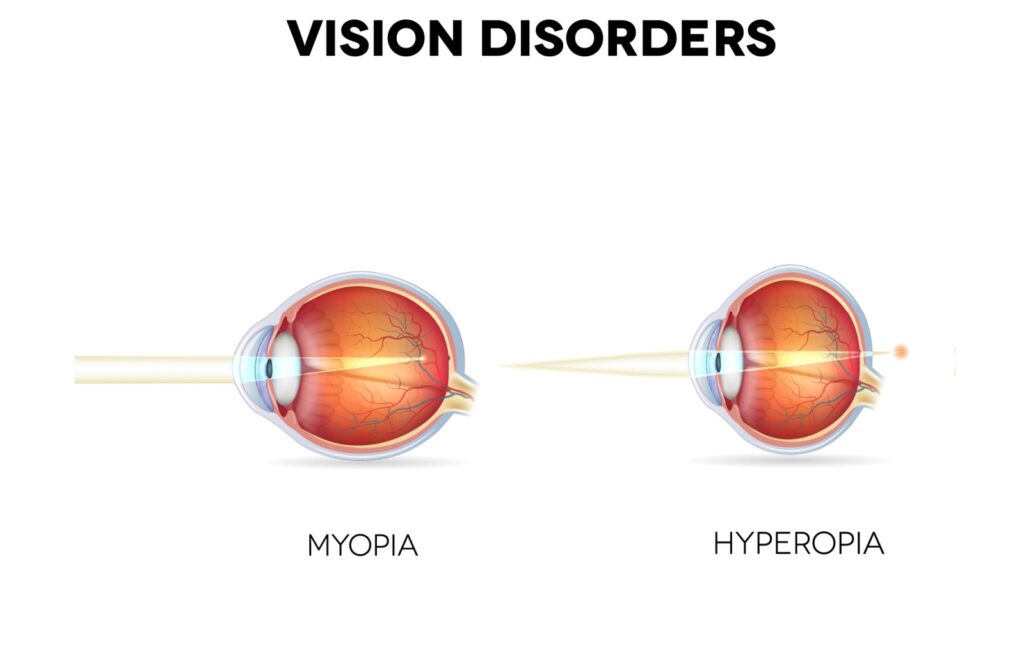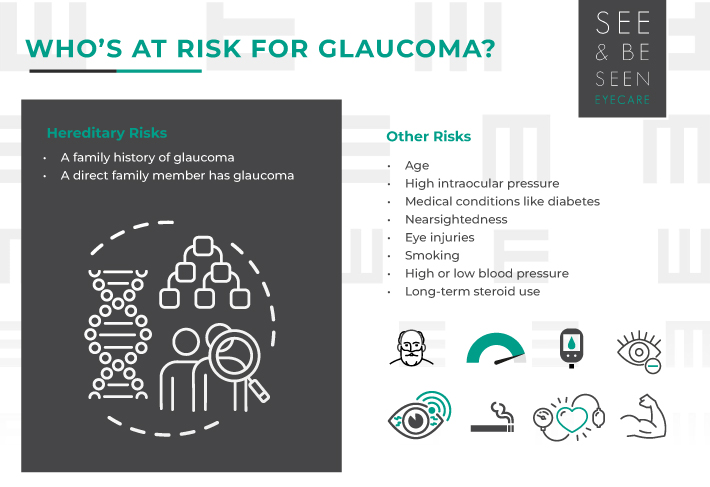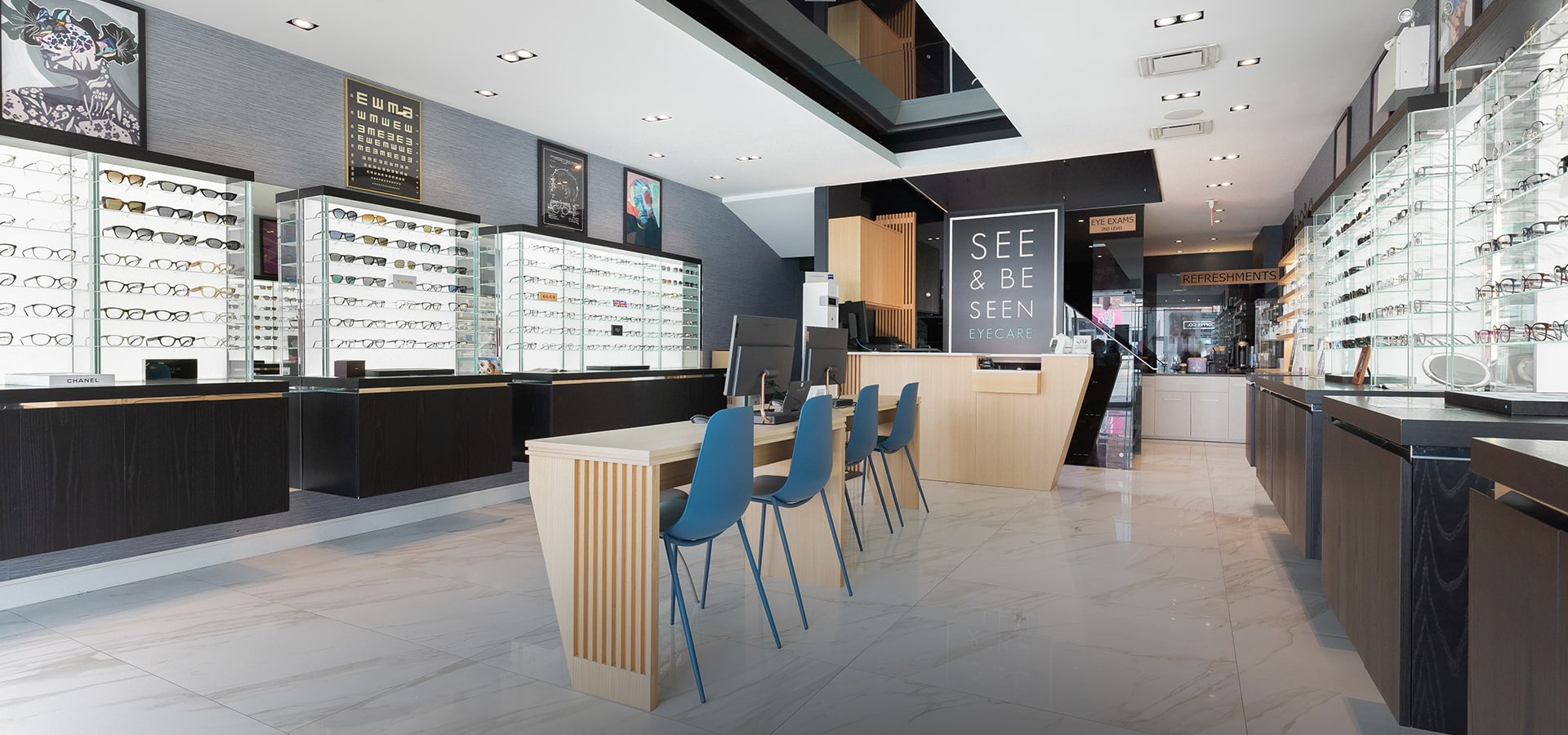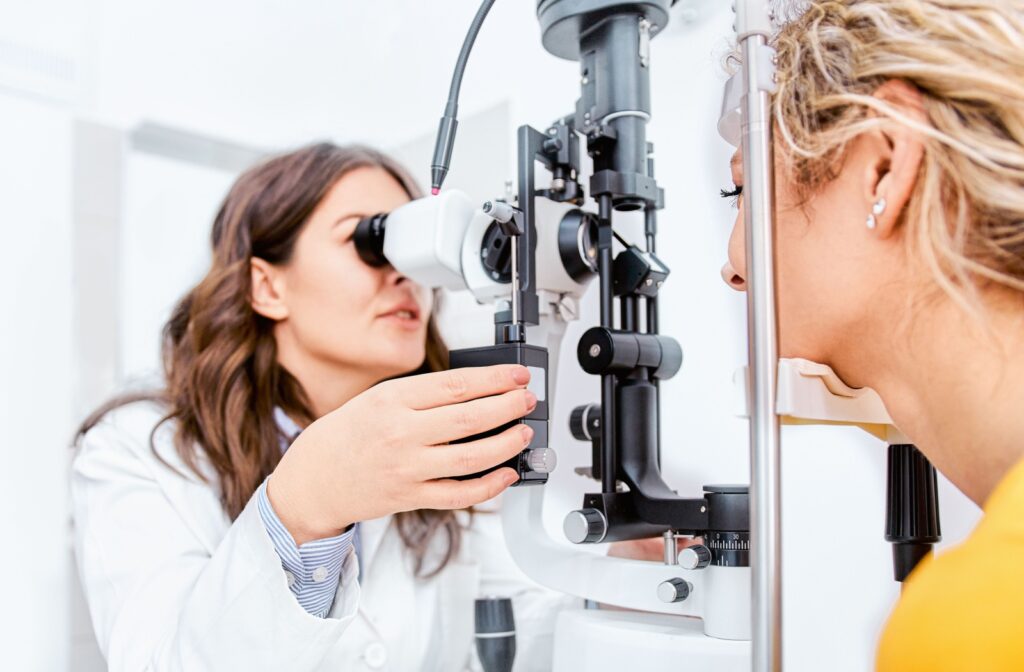Is glaucoma something you can inherit from your parents? The short answer is yes, but it’s not as simple as just one gene being passed down from parent to child. Glaucoma is a complex eye disease affected by both genetic and environmental factors.
Regular eye exams are crucial for early detection and management.
What Is Glaucoma?
Glaucoma is a group of eye diseases that damage the optic nerve. It can progress with little or no early symptoms and cause irreversible vision loss, earning it the moniker: “the silent thief of sight.” There are many types of glaucoma, and most of them can advance for years before you even realize you have a problem.
Glaucoma is one of the leading causes of blindness in Canada and affects nearly 728,000 Canadians. Risk factors include:
- Age (especially over 60)
- Nearsightedness
- Diabetes
- Low or high blood pressure
- Long-term steroid or cortisone use
- Thin cornea
There are many forms of glaucoma.

Primary Open-Angle Glaucoma
Primary open-angle glaucoma (POAG) is the most common type, accounting for 90% of all cases.
In a healthy eye, its internal pressure (IOP) is balanced by a clear fluid called aqueous humor, which circulates through its drainage system. In POAG, this drainage system looks open, but something prevents the fluid from draining efficiently, causing the IOP to become elevated. This elevated pressure is thought to put stress on the optic nerve, causing damage.
Primary Normal-Tension Glaucoma
Normal-tension glaucoma (NTG) is also known as low-tension or normal-pressure glaucoma. Damage to the optic nerve occurs despite having normal intraocular pressure. The cause of NTG is still being explored, but it’s thought to do with poor blood flow to the optic nerve.
Interestingly, medications that lower IOP still help prevent vision loss from NTG.
Angle-Closure Glaucoma
Angle-closure glaucoma occurs when the eye’s drainage angle becomes narrowed or blocked. This blockage leads to a buildup of fluid, which increases IOP, optic nerve damage, and vision loss.
There are 2 main types of angle-closure glaucoma, each with distinct presentations: acute and chronic.
Acute angle-closure glaucoma is a medical emergency. It occurs suddenly and can lead to rapid vision loss and intense symptoms, including:
- Intense eye pain
- Blurred vision
- Seeing halos around lights
- Nausea and vomiting
- Sudden redness in the eye
Chronic angle-closure glaucoma develops more gradually and may not cause any noticeable symptoms at first. The drainage angle narrows slowly over time, leading to a gradual rise in IOP that can damage the optic nerve. Some people with chronic angle-closure glaucoma may experience occasional episodes of acute symptoms.
Secondary Glaucoma
Secondary glaucoma arises as a consequence of another medical condition or eye injury. It has a clear external cause that disrupts the normal function of the eye’s drainage system or damages the optic nerve directly. Some external causes can include:
- Diabetes
- Eye tumors
- Medications
Any symptoms will vary depending on the underlying cause but can include sudden changes in vision, eye pain, and redness.
Congenital Glaucoma
Congenital glaucoma refers to a group of glaucoma conditions present at birth or develop very early in childhood, typically within the first 3 years of life. Unlike primary open-angle glaucoma, congenital glaucoma arises due to abnormal development of the eye’s drainage system before birth.
There are different types of congenital glaucoma:
- True congenital glaucoma is the most common type and is caused by a complete blockage in the drainage channels.
- Infantile glaucoma develops between 1 and 36 months of age.
- Juvenile glaucoma presents after 3 years of age but before adulthood.

Is a Family History of Glaucoma a Cause for Concern?
Glaucoma isn’t something you necessarily inherit directly from a family member, but genetics play a role.
If you have a close relative, like a parent or sibling, with glaucoma, you’re more likely to develop it yourself. The more affected family members you have, the higher your risk increases. This suggests a genetic predisposition, meaning certain genes may make you more susceptible to the disease. However, these genes don’t guarantee you’ll get glaucoma.
The way glaucoma is passed down through generations can be complex. In some cases, particularly early-onset forms, the inheritance pattern might be simpler, with a single gene playing a more significant role. However, for glaucoma diagnosed later in life, the story becomes more intricate. A combination of genes and environmental factors likely work together to influence your risk.
Can Primary Open-Angle Glaucoma Be Prevented?
Unfortunately, there’s no guaranteed way to prevent POAG. However, it can be managed, and optic nerve damage and vision loss can be slowed or prevented, protecting your eyesight.
The key is routine eye exams and early detection. Since POAG often progresses silently with minimal early symptoms, regular eye exams allow your eye doctor to detect the disease early and implement treatment strategies to manage IOP and vision loss.
While you can’t control your genetic predisposition, you can follow some lifestyle habits to help:
- Maintain a healthy weight: Obesity is a potential risk factor for glaucoma.
- Wear eye protection: Protect your eyes from sunlight and injury.
- Exercise regularly: Moderate exercise routines can help with overall health and may benefit IOP.
- Eat a healthy diet: A diet rich in fruits and vegetables can be good for eye health.
- Limit smoking and alcohol consumption: Smoking and excessive alcohol intake are associated with various health risks, including glaucoma.
Find Comprehensive Glaucoma Support at See & Be Seen Eyecare
Glaucoma can be challenging, but with the right support and care, you can maintain good eye health and quality of life. At See & Be Seen Eyecare, our team of experienced optometrists can detect and help manage glaucoma. We offer comprehensive eye exams and personalized treatment plans to support your total eye health.




